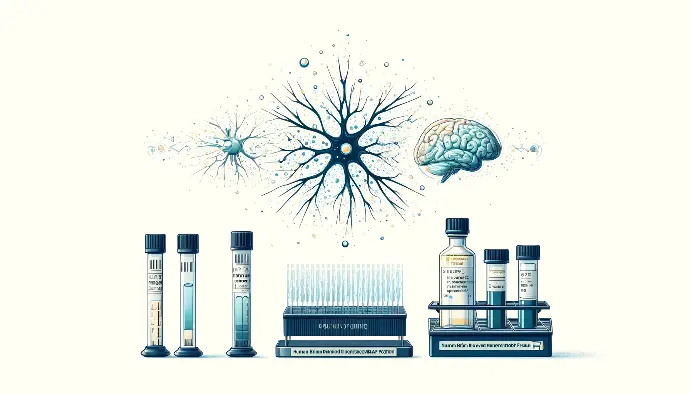
Brain Derived Neurotrophic Factor (BDNF) is a critical protein involved in the growth, development, and maintenance of neurons in the central and peripheral nervous systems. Dysregulation of BDNF expression has been implicated in various neurological and psychiatric disorders, making it an important target for research and clinical diagnostics. Enzyme-Linked Immunosorbent Assay (ELISA) kits designed for the quantitative measurement of human BDNF levels provide researchers and clinicians with valuable tools for studying neurotrophic signaling pathways.
Principles of BDNF ELISA Kits
BDNF ELISA Kits employ a sandwich immunoassay format to quantitatively detect and measure the concentration of human BDNF in biological samples such as serum, plasma, tissue lysates, and cell culture supernatants. The assay typically utilizes specific antibodies raised against BDNF to capture the protein of interest and generate a measurable signal. In a typical BDNF ELISA assay, a capture antibody is immobilized onto the surface of a microplate well, followed by the addition of the sample containing BDNF. After incubation and washing steps to remove unbound components, a detection antibody conjugated to an enzyme, such as horseradish peroxidase (HRP), is added to bind to the captured BDNF. Subsequent addition of a substrate solution initiates an enzymatic reaction, resulting in the development of a colored product proportional to the concentration of BDNF present in the sample. The intensity of the color is measured spectrophotometrically, and the BDNF concentration is determined by comparison to a standard curve generated using known concentrations of BDNF standards.
Applications of BDNF ELISA Kits
BDNF ELISA Kits find broad applications in both basic research and clinical diagnostics. Some common applications include:
Neurobiology Research
Quantitative measurement of BDNF levels in neuronal cultures, brain tissue samples, and animal models to study neurodevelopment, synaptic plasticity, and neurodegenerative diseases.
Psychiatric Disorders
Investigation of BDNF dysregulation in psychiatric disorders such as depression, schizophrenia, and bipolar disorder, and evaluation of BDNF as a potential biomarker for disease diagnosis and prognosis.
Neurological Diseases
Assessment of BDNF levels in neurological disorders including Alzheimer's disease, Parkinson's disease, and multiple sclerosis, to elucidate disease mechanisms and identify therapeutic targets.
Drug Development
Screening and evaluation of pharmacological agents and therapeutic interventions targeting BDNF signaling pathways for the treatment of neurological and psychiatric disorders.
Clinical Diagnostics
Quantification of BDNF levels in patient samples for diagnostic purposes, monitoring disease progression, and evaluating treatment responses.
Considerations for BDNF ELISA
When using BDNF ELISA Kits, several factors should be considered to ensure accurate and reliable results:
Sample Type and Preparation
Optimize sample collection and preparation procedures to minimize interference from matrix effects and ensure compatibility with the assay.
Assay Sensitivity and Dynamic Range
Choose an ELISA kit with appropriate sensitivity and dynamic range to detect BDNF levels within the physiological range of interest.
Assay Specificity
Verify the specificity of the ELISA kit for human BDNF to avoid cross-reactivity with related proteins or interference from endogenous substances.
Standardization and Quality Control
Follow standard protocols and quality control measures provided by the manufacturer to ensure reproducibility and reliability of results.
Data Analysis
Use appropriate software and statistical methods to analyze ELISA data, including standard curve fitting and calculation of sample concentrations.
Human Brain Derived Neurotrophic Factor ELISA Kits provide researchers and clinicians with valuable tools for quantitative measurement of BDNF levels in biological samples. By employing a sensitive and specific immunoassay format, BDNF ELISA Kits enable the study of neurotrophic signaling pathways in health and disease, with applications ranging from basic research to clinical diagnostics and drug development. With careful consideration of assay parameters and experimental conditions, BDNF ELISA Kits offer reliable and reproducible results, advancing our understanding of BDNF biology and its implications for neurological and psychiatric disorders.